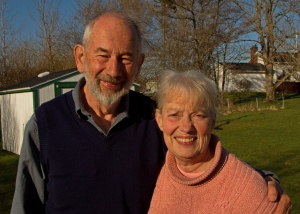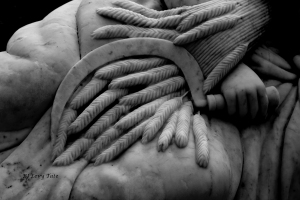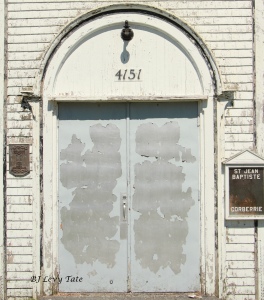I am thinking today of my friends who have said good-bye to loved ones in 2015, and are about to enter a year that their lost companions will never experience. For those gone to their sleep, 2015 was the conclusion of their road – a way station to somewhere else. We all have that final year waiting to be inscribed on our own memorials. But unless we are very unlucky today, 2015 will not be it.
My husband was a newshound. Almost as long as I knew him, at 7:30 the NBC Nightly News was his focus for half an hour. Nothing else intruded. He watched other news media as well, but for some reason that was his favourite as he grew older. He also enjoyed CNN. If a breaking story caught his attention, he’d turn to various sources for updates. At the supper hour, Canadian channels predominated – CTV or ATV, CBC, Global. The daily paper then supplied more in-depth coverage of stories already known. We were a well-informed family.
When he was hospitalized at the end, I arranged for TV rental. However, he hardly glanced at the news broadcasts, and I realized then how very ill he was. He had detached himself from the world around him. Letting go of ongoing events seemed so uncharacteristic of the man. Now, looking back, I understand that he had no further need to follow these situations. He knew it wouldn’t matter and that time, for him, was about to stop. I would have to pursue the developing stories on my own. I have not watched NBC Nightly News since then.
How he would have loved the Justin Trudeau groundswell, the election, the excitement of transition! How he would have relished the endless debates about everything from Syrian refugees to the faltering Yarmouth ferry service to the plans for Mother Canada! He would have wept for Paris and Ankara and San Bernardino. He would have recalled his own arrival through Pier 21 as the Syrian newcomers were welcomed to Halifax. He’d now be tracing the rise of Donald Trump. shaking his head in disbelief, and poring over TIME magazine for each election installment. But for him, “now” only goes as far as April 21, 2015. Whatever has come next, I cannot know.
So what is time, anyway? Is it linear? I don’t think so, nor do the great temporal physicists like Stephen Hawking and Albert Einstein, but we have to make it that way so our human brains can comprehend its passage. We assign numbers to the line and mark our progress by referring to them. But the whole idea of time is inherently a comparison between various states of existence that constantly change. If the universe were static – motionless – would we still measure time or even think about it? Would it matter? New Year’s Eve would become rather irrelevant, I should imagine. We’d be buying our champagne and sparklers just for the heck of it.
“People like us who believe in physics know that the distinction between the past, the present and the future is only a stubbornly persistent illusion.” – Albert Einstein
Indeed. We choose our illusions, then, and live with them because to do otherwise would be too much for our minds to handle. Plato’s theory of forms suggests that ideas existed in perfection, separate from their reflections in our own world. In their “place beyond heaven” (Phaedrus), these forms pattern the universe, and we imitate them but can never quite achieve their purity. All, then, is imitative and – while intelligible to our senses – not quite truthful. And what we perceive isn’t always real. Colours change with the light. What looks blue to me might look purple to you. Think of “the dress” that took Facebook by storm a few months ago. What colour was it, really? And who gets to decide?
Time and Illusion. Or are they the same thing? Time AS illusion? I’m just a poet. I can’t begin to go there.
But the year turns tonight and the last people to die in 2015 will have done so. The gravestone-carvers will inscribe that final “5” and move on to a “6”. Those whom time is leaving behind will see neither peace nor war to come; neither celebration nor grief. They remain eternally in the span to which they have been assigned. We have to walk away and if we turn to look back, there is only silence. Snow, perhaps. An odd salt taste on our lips.
We – not being dead – confront whatever waits for us. We ride in an open carriage, ancient and unfamiliar, while all around us the engines roar by, or above, or under. Space stations orbit, jets trail across the horizon, race cars circle a child’s playroom track. But we’re huddled in an Emily Dickinson poem, almost 130 years after she set down her pen forever. We see only the back of our driver, who handles the reins with ease and confidence. Clearly, there’s only one direction to be taken. The horses clatter on stones that spark fire from their heels. We can look toward the very edge of the universe if we keep going. There’s Polaris beaming us north, and Orion swinging his sword arm in his solitary hunt. The blurred galaxies swim like flecks on velvet. Somewhere, angels are caroling, or maybe that’s just the solar wind heading toward its own fate. It has a low voice not everyone can hear.
I shrug off my worn overcoat of mourning, and put on hope like a lap robe for the journey, to warm my feet. In the crowded darkness, a watchmaker adjusts the minute and second hands to mark this midnight hour. I do not believe he is blind, as some might call him. He simply has no need for optics. He can feel the rightness of things.
Then come the Roman Candles and Catherine Wheels. Someone across the river sets off a string of explosions. I raise my glass to the window, seeing only my own face reflected in its pane. The reality of myself – or just the idea of me? The wine glints in starlight. A Parisian baby opens her eyes for her first astonished look at life. A very old man in Corner Brook smiles and wishes “Happy New Year” to his fragile wife. A shopkeeper in New Delhi kisses his new bride and listens to a ghazal singer from the street. Slowly, with great precision, the planet moves through her own dance.
High over my roof, wild geese vee across a skein of clouds, heading for somewhere else. No map required. They know the way.



